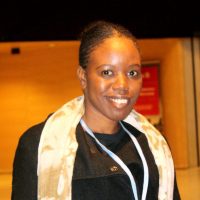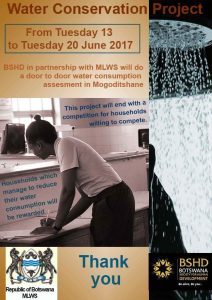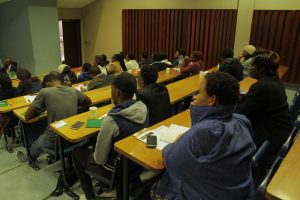In partnership with the Botswana Stuttering Association
Theme: “Speech Communication Disorders”
On June 24, 2017 the Botswana Society for Human Development (BSHD) NGO in partnership with the Botswana stuttering association (BOSA) will host its third annual disability workshop under the theme “Understanding Communication Disorders: Language and Speech Disorders. Through this workshop we aim to:
Identify and explain the different communication disorders and bring awareness to this form of disability.
Explore the different forms of speech and language disorders such as stuttering.
Share on understanding assessment, early intervention and remedial strategies for learners with communication disorders
Elaborate on the work of speech therapists and speech pathologists as well as other professionals in the field.
To get involved please contact Ms Tshepiso Van Zyl on: +267 7401 9517
BSHD NGO has a special interest disability issues. In July 2015, the NGO launched the annual disability workshop initiative. The first workshop which attracted over 120 people including speakers from the Office of the President, the University of Botswana, Princess Marina Hospital and Zimbabwe among others was themed Special Education. The following the workshop was themed Mental Health. This year, the workshop means to address Speech and Language Disorders in Young Children and Adults, hence the theme UNDERSTANDING SPEECH AND LANGUAGE DISORDERS IN YOUNG CHILDREN AND ADULTS.
Botswana Stuttering Association – Our 2017 Workshop Partner
Botswana Stuttering Association (BoSA) is a non-profit organisation dedicated to bringing hope and dignity to children and adults who stutter, their families and professionals through empowerment, support and advocacy. The association was founded in October, 5th 2014 and registered on April 2016. It was formed by Boago Victor Ratshoswane, who is a stutterer as well and has majority members with the same speech impediment. BoSA supports and provides information to people who stutter, in efforts to instill a sense of self-worthiness. In addition, provide support and therapeutic techniques to people who stutter through support meetings, boot camps and workshops. Since inception, the association has held a boot camp for children under ages of 15, focusing on improving their speech, dignity and other negatives that are common effects of the impediment. Furthermore, held a public speaking workshops for young adults who stutter, in efforts to encourage and show them that their impediment is not a barrier to discovering their full potential. BoSA also commemorates and celebrates international stuttering day held on October 22nd, each year.
Workshop Justification
Human beings are the only species that have the ability to form and articulate spoken language. The human brain is expected to learn language and communication skills before the age of five. If this milestone is not reached human beings are often classified as having speech and language disorders. These speech and language disorders are defined as problems in communication and related areas such as oral motor function. These disorders include stuttering, impaired articulation, language and voice impairments that adversely affects a child’s educational performance. The delays and disorders may range from simple sound substitutions to the inability to understand or use language correctly. A child’s communication is considered delayed if he/she is noticeably behind their peers in acquiring speech. In some cases some children are more receptive and understand language but are unable to express themselves orally.
Speech disorders are often characterized as difficulties in producing speech sounds or problems with voice quality. The symptoms of speech disorders are different for every child, some are characterized as an interruption in the flow or rhythm of speech such as stuttering (Dysfluency), while others present in the form of problems with the way sounds are formed ( articulation or phonological disorders). Language disorders are referred to as impairments in the ability to understand or use words in context both verbally or none verbally. They are often characterized by improper use of words and their meaning, inability to express ideas and in appropriate grammatical patterns. In most cases children who are affected by language learning disabilities or developmental language delay may present these symptoms. Some may be able to see or hear the words that are spoken but may not be able to comprehend them. Although the exact causes of speech language disorders may not be known some specialists in the area speculate that hearing loss, neurological disorders, brain injury, mental retardation, drug abuse and physical impairments are some of the causes.
While the total number of children living with disabilities in Botswana is not ascertained, statistics show that at least 58976 people are persons living with disability. The 2001 statistics show that In Botswana speech impairment accounts for 9.9 % of the population of people living with disabilities in the country. In 2013 statistics showed that 45.4 % of pre-primary pupils with special education needs had speech impairments. 0ut of 229 children with special education enrolled in pre-primary school across the country in 2013, the number of pupils with speech impairments was the highest at 104 followed by those with multiple disabilities. With such a high number of young children with speech impairments it is only ideal to explore the concepts of language and speech disorders so as to provide the much needed information to the public, parents and teachers of students and children with learning disorders.
That said, this year’s workshop will dwell mostly on speech and language disorders as well as other related disorders such as hearing impairment and other physical disorders that contribute to the causes of communication disorders.
OBJECTIVES OF THE WORKSHOP
Define communication disorders
Explaining the difference between language and speech disorders
Exploring types of speech and language disorders(stuttering, impaired articulation, language or voice impairment, speech sound production impairment, fluency impairment, voice resonance impairment)
Exploring the relationship between hearing impairment and other physical disorders that may hinder speech and language development.
Describing how learning a second language may contribute towards language disorders.
Explaining speech therapy and speech language pathology
Understanding English (phonics, syntax and pragmatics, reading comprehension teaching language to primary school children)
Active English –remedial for learners with language disorders.
Understanding use of assistive technology to remediate language and speech development.
Exploring and understanding remedial strategies for learners with language and speech disorders


